

The Coming Software Apocalypse - The Atlantic. There were six hours during the night of April 10, 2014, when the entire population of Washington State had no 911 service.
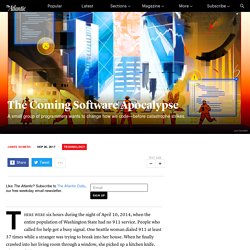
People who called for help got a busy signal. One Seattle woman dialed 911 at least 37 times while a stranger was trying to break into her house. When he finally crawled into her living room through a window, she picked up a kitchen knife. The man fled. To hear more feature stories, see our full list or get the Audm iPhone app. The 911 outage, at the time the largest ever reported, was traced to software running on a server in Englewood, Colorado. Why 2°C? The Range and the Risks - an Earth101 short.
We can still rescue this planet from climate change. Here's how. I and my colleagues have spent a decade or more trying to get a handle on tipping points in complex systems.
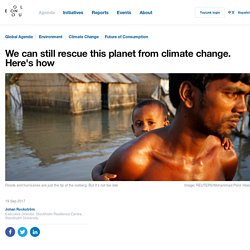
A tipping point is when something changes rapidly to a new state - like water turning to ice at zero degrees Celsius, or when a virus bubbling around in a population suddenly explodes into an epidemic, as if from nowhere. We’ve been looking for signs – early warning signals – of approaching tipping points. The Oil Ghost Towns of Texas - Bloomberg. If Texas’s Permian Basin is Exhibit A for the U.S. oil boom that refuses to die, then the Eagle Ford, a smaller shale patch some 400 miles to the east, represents all those places that have been left behind.
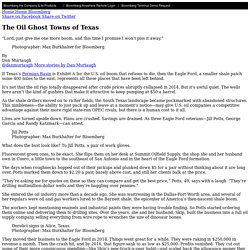
It’s not that the oil rigs totally disappeared after crude prices abruptly collapsed in 2014. But it’s awful quiet. The wells here aren’t the kind of gushers that make it attractive to keep pumping at $50 a barrel. As the shale drillers moved on to richer fields, the South Texas landscape became pockmarked with abandoned structures. Is this Japanese concept the secret to a long, happy, meaningful life? What’s your reason for getting up in the morning?

Just trying to answer such a big question might make you want to crawl back into bed. If it does, the Japanese concept of ikigai could help. Originating from a country with one of the world's oldest populations, the idea is becoming popular outside of Japan as a way to live longer and better. While there is no direct English translation, ikigai is thought to combine the Japanese words ikiru, meaning “to live”, and kai, meaning “the realization of what one hopes for”.
Every Single Cognitive Bias in One Infographic. Collapse of Global Civilization by 2020-Irrefutable Evidence : collapse. Nicholas Georgescu Roegen, la bioeconomia e la legge dell'entropia. Sosteneva Ezra Pound che non si può comprendere un’epoca se non si approfondisce il sapere che più la caratterizza, se, insomma, non se ne intende appieno la specifica “cifra” culturale.

Pensava, il grande poeta dei Cantos, alla romanità del diritto, al Medioevo della teologia, all’arte del Rinascimento, alla scienza del XIX secolo, l’economia del Novecento, secolo breve ed insieme sterminato. Potremmo, per il primo scorcio del TerzoMillennio, indicare con sicurezza, come impronta generale della contemporaneità la Tecnica (“techne”, il saper fare che mira ad un obiettivo o ad un prodotto), per quanto la sua centralità sia stata già descritta da Martin Heidegger nella temperie culturale tra le due guerre. Climate Armageddon Revisited. It was only five years ago that Scientific American published this article: Climate Armageddon: How the World’s Weather Could Quickly Run Amok, d/d May 25, 2012.
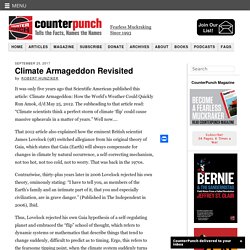
The subheading to that article read: “Climate scientists think a perfect storm of climate ‘flip’ could cause massive upheavals in a matter of years.” Well now…. That 2012 article also explained how the eminent British scientist James Lovelock (98) switched allegiance from his original theory of Gaia, which states that Gaia (Earth) will always compensate for changes in climate by natural occurrence, a self-correcting mechanism, not too hot, not too cold, not to worry. That was back in the 1970s. One chart shows all the bubbles that are about to pop. Getty Images It wasn’t always this way.

We never used to get a giant, speculative bubble every seven to eight years. We really didn’t. In 2000, we had the dot-com bubble. In 2007, we had the housing bubble. Vještičji ormar (The Broom Closet): "As above, so below"...what's that now? Perhaps you have heard this saying, and I wouldn't be surprised if you have because it has become on of the most well-known phrases used in Paganism, Hermeticism, Wicca and other related philosophical and spiritual paths as well as an accepted idiom in occult circles.

Even if you haven't heard of it up to now, I'll try to explain it as best as I can! :) "That which is below is like unto that which is above, and that which is above is like unto that which is below, for the performing of the miracles of the One Thing. " Simply put, what this phrase means is "what is found in the heavens is reflected here on earth". Although, there are a few ways in which we can interpret this, but I'll get to that in a bit. Before giving any detailed interpretations, I would first like to talk about the origins of this interesting sentence which can be found in the 6th-8th century (although some claim it dates all the way back to antiquity). The 97% consensus on global warming. Building Community & Embracing Diversity – Daniel Christian Wahl – Medium.
“Never doubt that a small group of committed citizens can change the world; indeed it is the only thing that ever has.” — Margaret Mead Building community can make all the difference!
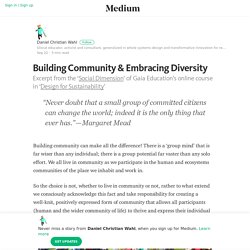
There is a ‘group mind’ that is far wiser than any individual; there is a group potential far vaster than any solo effort. You know you are in trouble when… – un-Denial. Examples of denial are both profound and unacknowledged.
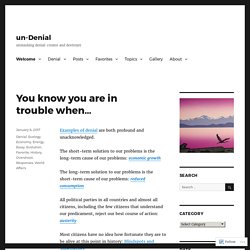
The short-term solution to our problems is the long-term cause of our problems: economic growth The long-term solution to our problems is the short-term cause of our problems: reduced consumption All political parties in all countries and almost all citizens, including the few citizens that understand our predicament, reject our best course of action: austerity Most citizens have no idea how fortunate they are to be alive at this point in history: Blindspots and Superheroes.
The Finnish Experiment - 99% Invisible. Around the world, there is a lot of buzz around the idea of universal basic income (also known as “unconditional basic income” or UBI). It can take different forms or vary in the details, but in essence: UBI is the idea a government would pay all citizens, employed or not, a flat monthly sum to cover basic needs. This funding would come with no strings attached or special conditions, which would remove any potential stigma associated with receiving it.
In short: it would be free money. UBI advocates argue that many jobs don’t pay enough to even make rent and buy groceries: people can work full-time and still be below the poverty line. Urge, Splurge, Purge – George Monbiot. The demand for perpetual economic growth, and the collective madness it provokes, leads inexorably to environmental collapse By George Monbiot, published in the Guardian 13th September 2017 There was “a flaw” in the theory: this is the famous admission by Alan Greenspan, former chair of the Federal Reserve, to a congressional inquiry into the 2008 financial crisis.
His belief that the self-interest of the lending institutions would lead automatically to the correction of financial markets had proved wrong. Now, in the midst of the environmental crisis, we await a similar admission. Energy. 100 Percent Wishful Thinking: The Green-Energy Cornucopia - Resilience. Ecosystem Services as Boundary Objects for Transdisciplinary Collaboration - ScienceDirect. <div pearltreesdevid="PTD140" role="alert" class="alert-message-container"><div pearltreesdevid="PTD141" aria-hidden="true" class="alert-message-body"><span pearltreesdevid="PTD142" style="display: inline-block;" class="Icon IconAlert"><svg pearltreesDevId="PTD143" style="width: 100%; height: 100%;" width="24" height="24" focusable="false" tabindex="-1" fill="currentColor"><path pearltreesDevId="PTD144" fill="#f80" d="M11.84 4.63c-.77.05-1.42.6-1.74 1.27-1.95 3.38-3.9 6.75-5.85 10.13-.48.83-.24 1.99.53 2.56.7.6 1.66.36 2.5.41 3.63 0 7.27.01 10.9-.01 1.13-.07 2.04-1.28 1.76-2.39-.1-.58-.56-1.02-.81-1.55-1.85-3.21-3.69-6.43-5.55-9.64-.42-.52-1.06-.83-1.74-.79z"></path><path pearltreesDevId="PTD145" d="M11 8h2v5h-2zM11 14h2v2h-2z"></path></svg></span><!
-- react-text: 58 -->JavaScript is disabled on your browser. Please enable JavaScript to use all the features on this page. <! -- /react-text --></div></div> How Vulnerable Are We to Collapse? - SAPIENS. Along the cottonwood-lined rivers of southwestern New Mexico and southeastern Arizona, the Mimbres people did something unique: By the year 1000, these farmers were producing stunning ceramics decorated with naturalistic images of fish, people, and rabbits, as well as magical creatures and elaborate geometric patterns. And then, rather abruptly, they stopped. After roughly a century of higher than normal rainfall, the area the Mimbres inhabited suffered a powerful drought, as indicated by the archaeological record.
Big game—already scarce—became even less abundant, and it became harder to grow the beans, corn, and squash that the Mimbres relied on. By about 1150 the Mimbres were no longer making their signature pottery. Economyths: The Five Stages of Economic Grief. By David Orrell Swiss psychiatrist Elisabeth Kübler-Ross, a pioneer in the field of grief counselling, identified the five stages of grief as denial, anger, bargaining, depression, and acceptance.
This extract from Economyths draws on her model of grief as inspiration to chart the long, arduous, but ultimately healthy and healing (we hope, it’s not over yet) process as the economics profession slowly comes to terms with its role in the Great Financial Crisis. The ten years since the first tremors of the crisis began in 2007 have been a difficult journey, not just for the world economy, but also for the economics profession. The status of the field had never been higher than in the two decades preceding the crisis, during what Ben Bernanke and others called the Great Moderation. Inflation and macroeconomic volatility seemed to be under control, and total national income was growing at an almost steady rate (the fact that total debt was growing even faster was less remarked upon).
On the Road to Extinction: Maybe it’s Not All About Us. Photo by Nathaniel St. Clair It is crystal clear—unlike the smoky skies where I live–to most of us who are willing to consider the facts: this summer’s ‘natural’ disasters have been seeded anthropogenically. Wildfires in the northwestern United States and Canada, in Greenland, and in Europe are often referred to in the media as ‘unprecedented’ in size and fury. New research, September 4-10, 2017. The Massive Impact of EVs on Commodities in One Chart. After three years among hunter-gatherers in the Kalahari, I was convinced that their… The great nutrient collapse. Irakli Loladze is a mathematician by training, but he was in a biology lab when he encountered the puzzle that would change his life.
A List of Occupations. Beyond Civilization: Humanity's Next Great Adventure. Life and death in Apple’s forbidden city. How Civilization Started. Science and technology: we tend to think of them as siblings, perhaps even as twins, as parts of STEM (for “science, technology, engineering, and mathematics”). Graduate-Level Preparedness - Articulating the Future. Die Propaganda-Matrix – Swiss Propaganda Research. This is how your world could end. Many of us share some dim apprehension that the world is flying out of control, that the centre cannot hold. Coupled Societies are More Robust Against Collapse: A Hypothetical Look at Easter Island - ScienceDirect. What War With North Korea Looked Like in the 1950s and Why It Matters Now. Réchauffement climatique: «Une catastrophe globale est garantie pour nos enfants» Une civilisation se termine et nous devons en bâtir une nouvelle. Le climat plus fort que l'économie ? - 28/08.
If everyone lived in an 'ecovillage', the Earth would still be in trouble. KunstlerCast 294 - "There's No App for That" - Richard Heinberg - Kunstler. Capitalism: A Ghost Story. You're not going to believe what I'm about to tell you. Cómo se evitan en Cuba las muertes por huracanes. Cassandra's Legacy: Doughnut Economics:a step forward, but not far enough. Overpopulation: Coming face to face with a global food shortage in the coming century. Theconversation. Wetiko Inside And Outside: A Remarkable Teaching Moment, By Carolyn Baker. Wrong Kind of Green. The thermodynamics of learning. HEAT FOR TOMORROW. Grani antichi e moderni: Enzo Spisni risponde alle domande dei lettori. Inside the New Economic Science of Capitalism’s Slow-Burn Energy Collapse - Resilience. 11 Creative Pallet Projects You Can Easily Make Yourself. ERoEI for Beginners. Limits to Growth was right. New research shows we're nearing collapse.
Theconversation. Bitcoin, la catastrofe ecologica. Bitcoin, la catastrofe ecologica. Better A Year Early Than A Day Too Late. Peak Oil Review: Aug 21, 2017 - Resilience. One Small Town. Hate is the New Sex - Ecosophia. Why Climate Change Isn’t Our Biggest Environmental Problem, and Why Technology Won’t Save Us Post Carbon Institute. How is an Oil Fizzle Dragon-King created? – Dr Louis Arnoux – Medium. Looking down the barrel — the Tooth Fairy & the Dragon-King.
The Surprisingly Large Energy Footprint of the Digital Economy. Neoliberalism: the idea that swallowed the world. Looking down the barrel – Dr Louis Arnoux – Medium. Systemic Change Driven by Moral Awakening Is Our Only Hope. Lithium’s limits to growth. Uncertainty is the best tool to navigate toward our post-carbon future. Implicazioni e problematiche di una "Società a 2000 watt" Flashcards to Learn 168 Cognitive Biases – Tradecraft – Medium. Richard Sylla: This Is An Inherently Dangerous Moment In History. Our Photovoltaic Future: The Metabolic Revolutions of the Earth's History. Soil natural capital in europe; a framework for state and change assessment. Are We Doomed? Let’s Have a Conversation. - Resilience. Are We Doomed? Let’s Have a Conversation. - Resilience. Controversy Explodes over Renewable Energy Post Carbon Institute. So what if we’re doomed? (Down the Dark Mountain) A despot in disguise: one man’s mission to rip up democracy. The great British Brexit robbery: how our democracy was hijacked.
How Trump Is Transforming Rural America. The Myth of Drug Expiration Dates. ClubOrlov: “Facts on the Ground” Neoliberalism has conned us into fighting climate change as individuals. Staving Off the Coming Global Collapse. Chi paga il conto per le banane equosolidali - Stefano Liberti - Internazionale. Nicole. Nicole Foss On Life After Complexity - The Automatic Earth. Much ado about methane « RealClimate. Earth's sixth mass extinction event already under way, scientists warn. New York Mag’s Climate Disaster Porn Gets It Painfully Wrong. When Will Climate Change Make the Earth Too Hot For Humans? Theconversation. The Inevitability Of DeGrowth. ERoEI for Beginners. Five Days that Shook My World, Part One: The Making of a Critical Thinking Community - Resilience. Is 100% renewable energy realistic? Here’s what we know. Posters Scientifiques - ChateauDav - La Roche sur Yon.